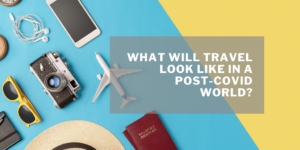
What Will Travel Look Like in a Post-COVID World?
I never thought I’d miss the chaos of an airport. Rushing to get out the door on time, then stressing over delayed Ubers and packed security lines. Not to mention dealing with a too-heavy carry on to avoid a checked-bag fee. But, I miss it all. For most of us, it’s been almost a full year since we’ve properly traveled. The amount of money lost to canceled vacations, cruises, weddings, and graduations is well into the billions. Not only are consumers trapped at home, but the travel industry is suffering through financial decline and an unclear future.
Analysis by Tourism Economics shows a week-by-week outlook on travel spending in the U.S. since March 1, 2020:
- Travel spending totaled $679 billion in 2020, a 42% annual decline (nearly $500 billion) from 2019.
- International travel spending fell 76% (compared to 34% for domestic travel) while business travel spending fell 70% (compared to 27% for leisure travel).
- Hawaii suffered the most of any state (-60% y/y) and Mississippi suffered the least (-26%).
- In total, 18 states and territories experienced a greater than 40% downturn in travel spending.
- From March – December 2020, the pandemic resulted in $492 billion in cumulative losses for the U.S. travel economy, equating to $1.6 billion per day.
- Depressed travel spending has caused a loss of $64 billion in federal, state, and local tax revenue since March 1, 2020.
1) Extra flexibility
Canceling or altering travel plans used to come with a hefty price tag. Ticket change fees (often the difference between the flight costs with an additional $200 to boot) and inflexible and unaccommodating airlines were the norm. With the threat of catching COVID always looming, airlines paused change fees, which gives fliers more peace of mind when booking a trip. This increased flexibility has expanded to car and RV rentals, the cruise industry, and Airbnb, too.
2) Longer stays to newer places
The rest of the world has often mocked the way Americans travel. We kill ourselves to finish all of our work in advance so we can spend five days locked in an all-inclusive resort. By the time we’ve adjusted to relaxing, it’s time to pack up and go home again. “I need a vacation from my vacation” explains the feeling well.
A consumer sentiment research report from TripAdvisor and Phocuswright found that, post-COVID, more than 50% of travelers say they are more likely to take outdoor-focused trips, and 65% aim to avoid crowds. This increases sustainability — reducing stress on tourist-packed cities like Barcelona and Amsterdam while drawing culture seekers to more remote adventures. Work-from-home as the norm also allows for longer, slower-paced travel in which professionals work during the day and explore on evenings and weekends, getting to experience a new place as a local would. Speaking of…
3) Vacationing closer to home
We’ve already seen this trend kick-off, with RV rentals skyrocketing over the summer as families road-tripped to national parks after canceling their annual beach vacation. Many travelers will remain cautious post-COVID and throughout 2021, choosing long weekend drives so they remain in familiar territory in case anyone starts to have a cough and can’t taste their food. Reviews are also growing increasingly vital, both online and by word of mouth, as people seek recommendations and reassurance about health and safety measures.
4) Strict cleanliness standards
I cringe at the thought of pre-pandemic cleaning practices. I had no idea how planes were sanitized and held a dirty subway pole on my commute at least twice a day, slammed shoulder to shoulder in a car full of people breathing all over each other. Disgusting. Now, cleanliness is a top concern for travelers. Hotels and vacation rentals have promoted more rigorous sanitation routines since the start of the pandemic. And there’s increased transparency around cleaning practices, with Delta recently announcing,
“Delta is partnering with RB, the makers of Lysol®, to drive greater confidence in travel by innovating cleaner more hygienic experiences for customers and employees, alike. … We will also work together to identify and address ongoing germ-related travel concerns for customers.”
What are your post-COVID travel plans? I have a meditation retreat in Sedona and a concert in Toronto booked, but, if 2020 taught me anything, it’s to not hold anything too tightly and remember that health comes first.




